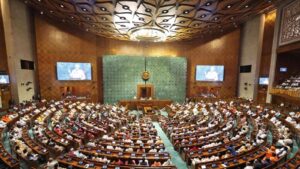ButSpeak.com
News which Matters.

Lok Sabha forms a joint parliamentary committee to examine the Waqf (Amendment) Bill, with heated debates on its implications, amid opposition concerns over targeting of Muslims.
On Friday, August 9, 2024, the Lok Sabha approved a motion to form a joint parliamentary committee tasked with examining the Waqf (Amendment) Bill. The motion, presented by Kiren Rijiju, Minister of Parliamentary Affairs and Minority Affairs, proposed that the committee be composed of 21 members from the Lok Sabha and 10 from the Rajya Sabha. The committee is expected to submit its report by the end of the first week of the next Parliament session.
The decision to refer the Waqf (Amendment) Bill to a joint committee came after a heated debate in the Lok Sabha, where tensions flared over the perceived implications of the proposed law. The Bill, introduced in the Lok Sabha on Thursday, August 8, 2024, has sparked significant controversy, with the government insisting that it does not intend to interfere with the functioning of mosques. However, the opposition has strongly criticized the Bill, arguing that it unfairly targets the Muslim community and constitutes an attack on the Constitution.
Minister Rijiju defended the decision to refer the Bill to a joint committee, emphasizing the importance of a thorough examination by representatives from both Houses of Parliament. The move aims to ensure a comprehensive review of the Bill’s provisions and their potential impact, amidst concerns raised by various stakeholders.
As the committee begins its work, it will likely face intense scrutiny from both supporters and critics of the Bill. The outcome of this examination will be closely watched, given the broader implications of the Waqf (Amendment) Bill for religious institutions and minority rights in India.